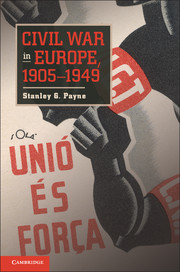Book contents
- Frontmatter
- Contents
- Preface
- Chronology of Events
- Glossary of Political Acronyms
- Introduction Revolution and Civil War as Forms of Conflict
- Part One World War I and An Era of Internal Conflict, 1905???1935
- Part Two The Conflict In Spain, 1931???1939
- Part Three Civil War and Internal Violence in The Era of World War II
- 8 The Multiple Wars of Europe, 1939???1945
- 9 The Civil Wars in Yugoslavia and Greece
- Conclusion
- Index
- References
8 - The Multiple Wars of Europe, 1939???1945
Published online by Cambridge University Press: 05 June 2012
- Frontmatter
- Contents
- Preface
- Chronology of Events
- Glossary of Political Acronyms
- Introduction Revolution and Civil War as Forms of Conflict
- Part One World War I and An Era of Internal Conflict, 1905???1935
- Part Two The Conflict In Spain, 1931???1939
- Part Three Civil War and Internal Violence in The Era of World War II
- 8 The Multiple Wars of Europe, 1939???1945
- 9 The Civil Wars in Yugoslavia and Greece
- Conclusion
- Index
- References
Summary
The idea of a universal civil war would never regain the prominence that it had briefly possessed in the years after 1917, yet this sense lingered into the 1930s, when it was exploited by Hitler as a kind of smoke screen to cloud German expansion, and was also developed in quite a different way by the Republicans in Spain, which eventually began to influence the thinking of Franklin Roosevelt. In a diffuse manner, a sense developed among more than a few that, whereas in 1914 there had been a great conflict between nation-states and empires, a new international struggle would be more a war for or against ideas – such as race, revolution, fascism, and antifascism – both because of the ideological character of the new dictatorships and because of the stimulation of political consciousness that they had provoked. Col. Amedeo Mecozzi, an Italian air force commander, wrote in 1937 “that the next European war will have the character of a civil war…. It will perhaps not be a war between countries but a war of ideals (which everyone claims to be his own position) against [false] ideologies, which everyone claims to be the other side’s.”
Certainly all modern wars have invoked ideals, but in reality the war that began in 1939 was a conflict of nations and empires, even though ideas played a more important role than in 1914. The fact that both sides immediately claimed the moral high ground was, of course, no novelty, and citizens of nearly all political persuasions supported their own countries. Communists at first were the principal exceptions, but in most countries fascists were not, for in Poland and France domestic fascists initially fought against Hitler.
- Type
- Chapter
- Information
- Civil War in Europe, 1905–1949 , pp. 193 - 207Publisher: Cambridge University PressPrint publication year: 2011



